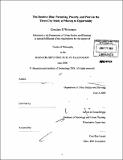| dc.contributor.advisor | Xavier de Souza Briggs. | en_US |
| dc.contributor.author | Weismann, Gretchen D | en_US |
| dc.contributor.other | Massachusetts Institute of Technology. Dept. of Urban Studies and Planning. | en_US |
| dc.coverage.spatial | n-us-ma n-us-ca n-us-ny | en_US |
| dc.date.accessioned | 2009-01-30T16:37:37Z | |
| dc.date.available | 2009-01-30T16:37:37Z | |
| dc.date.copyright | 2008 | en_US |
| dc.date.issued | 2008 | en_US |
| dc.identifier.uri | http://hdl.handle.net/1721.1/44365 | |
| dc.description | Thesis (Ph. D.)--Massachusetts Institute of Technology, Dept. of Urban Studies and Planning, 2008. | en_US |
| dc.description | Includes bibliographical references (p. 265-274). | en_US |
| dc.description.abstract | This study shows how kin networks, parental monitoring, and housing mobility structure low-income adolescents' engagement in risky and delinquent behavior. I use ethnographic data from a mixed-method study of a randomized housing experiment: The Three City Study of Moving to Opportunity. The ethnography was conducted over 8 months in 2004-2005 with thirty-nine families, including fifty-two male and female adolescents (ages 11-23) in greater Boston, Los Angeles, and New York. Beginning in 1994, two-thirds of the families (members of the experimental complier group) relocated from public and assisted housing in high poverty neighborhoods to very low poverty neighborhoods, using a rental housing voucher and other program supports. The remaining one-third of the sample, a control group, continued to live in high poverty "project" neighborhoods. Using case-study logic, I examine how the content and location of adolescent's daily routines and social ties to friends and relatives are associated with their involvement in risky and delinquent behavior. I also examine the role of parental monitoring and housing mobility patterns in moderating exposure to risk.I find that for most adolescents in the experimental-complier group, the neighborhood of residence has not become the primary neighborhood of influence in that the former only partially structures their routines and important social relations. How parents manage their social relations, especially with kin, shapes their children's level of engagement in new residential neighborhoods, and involvement in risky and delinquent behavior. | en_US |
| dc.description.abstract | (cont.) Socializing with kin is risky because it brings youth back to dangerous neighborhood environments and because many youth stay connected to kin who are actively engaged in risky and delinquent behavior, including gang banging, drugs, and crime. Parenting moderates this exposure, but for some families, it does not change dramatically after relocation. These findings contribute to research on low-income housing policy and neighborhood effects by demonstrating the critical role of extended family networks, ongoing housing mobility, and multiple neighborhoods of influence in shaping exposure to risk. My policy recommendations include strategies to: help very low-income families who escape high-risk neighborhoods to stay out of them over time, and to manage the risk in their lives. | en_US |
| dc.description.statementofresponsibility | Gretchen D. Weismann. | en_US |
| dc.format.extent | 327 p. | en_US |
| dc.language.iso | eng | en_US |
| dc.publisher | Massachusetts Institute of Technology | en_US |
| dc.rights | M.I.T. theses are protected by
copyright. They may be viewed from this source for any purpose, but
reproduction or distribution in any format is prohibited without written
permission. See provided URL for inquiries about permission. | en_US |
| dc.rights.uri | http://dspace.mit.edu/handle/1721.1/7582 | en_US |
| dc.subject | Urban Studies and Planning. | en_US |
| dc.title | The relative risk : parenting, poverty, and peers in the three city study of moving to opportunity | en_US |
| dc.type | Thesis | en_US |
| dc.description.degree | Ph.D. | en_US |
| dc.contributor.department | Massachusetts Institute of Technology. Department of Urban Studies and Planning | |
| dc.identifier.oclc | 276937542 | en_US |
